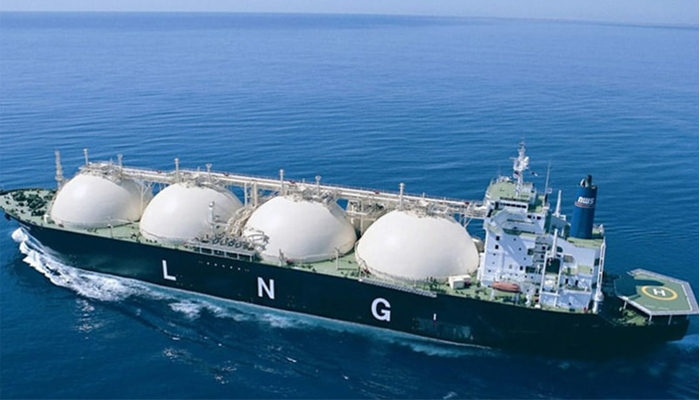Foreign investors chide govt for delaying LNG terminals
KARACHI: Foreign investors berated the government’s lethargy in giving a go-ahead to the private sector to set up liquefied natural gas (LNG) terminals amid gas demand continuing to outpace supply.
Overseas Investors Chambers of Commerce and Industry (OICCI), a representative body of foreign companies in Pakistan, said regulatory hurdles are causing delay in the upcoming terminals to regasify LNG.
“There will be severe shortage of gas this winter and OICCI members can help provided the upcoming LNG terminals are fast tracked,” said Haroon Rasheed, president of OICCI.
Rasheed told The News that it seems the bureaucracy is a little scared in taking bold decisions.
“The government needs to empower the bureaucrats,” he said.
The government estimated 250-400 million metric cubic feet per day of gas shortfall in the Sui Southern Gas Company system in the coming winters. Sui Northern Gas Pipelines that feed Punjab, Khyber Pakhtunkhwa and Kashmir would also face 300-350 mmcfd.
At least five private sector companies, including Tabeer Energy, Energas, Pakistan GasPort, Trafigura, Engro, and Gunvor planned to set up LNG terminals, each having regasification capacity of 500-700 million cubic feet per day.
OICCI submitted proposals to the government to improve the energy landscape in the country.
Rasheed said COVID 19 has had a serious impact on the business environment in Pakistan and more so in the region and bigger economies in Europe, Asia and USA and Canada. “This also has had an impact on the appetite for new investment by the potential international investors.”
The OICCI president said investors also assessed the impact of regional geopolitical situation, political and economic stability of the country and quality of its governance system and key institutions. “While the security situation has improved in Pakistan substantially, the negative perception of the country as a destination for foreign direct investment needs focused attention and improvement.” Rasheed said the government is focused on encouraging foreign investment in the country. Government appears quite determined to improve economic fundamentals and facilitate foreign direct investment. It has initiated review of governance structure, he said.
OICCI president flagged gap in policies and implementation, federal and interprovincial coordination, perception of the country in international media, increasing tax burden on compliant taxpayers, inflation and rupee depreciation as areas of concern. “Consistency of policies is also an issue as fiscal and tax incentives are sometimes abruptly rolled back hurting investments already undertaken based on the incentives,” he said.
Rasheed further said OICCI members planned to invest around $8 billion in the next three years and these investments will be coming in energy, infrastructure development, transportation and logistics, agriculture, corporate farming, pharmaceutical and information technology sectors.
-
 Prince William Questions Himself ‘what’s The Point’ After Saudi Trip
Prince William Questions Himself ‘what’s The Point’ After Saudi Trip -
 James Van Der Beek's Friends Helped Fund Ranch Purchase Before His Death At 48
James Van Der Beek's Friends Helped Fund Ranch Purchase Before His Death At 48 -
 King Charles ‘very Much’ Wants Andrew To Testify At US Congress
King Charles ‘very Much’ Wants Andrew To Testify At US Congress -
 Rosie O’Donnell Secretly Returned To US To Test Safety
Rosie O’Donnell Secretly Returned To US To Test Safety -
 Meghan Markle, Prince Harry Spotted On Date Night On Valentine’s Day
Meghan Markle, Prince Harry Spotted On Date Night On Valentine’s Day -
 King Charles Butler Spills Valentine’s Day Dinner Blunders
King Charles Butler Spills Valentine’s Day Dinner Blunders -
 Brooklyn Beckham Hits Back At Gordon Ramsay With Subtle Move Over Remark On His Personal Life
Brooklyn Beckham Hits Back At Gordon Ramsay With Subtle Move Over Remark On His Personal Life -
 Meghan Markle Showcases Princess Lilibet Face On Valentine’s Day
Meghan Markle Showcases Princess Lilibet Face On Valentine’s Day -
 Harry Styles Opens Up About Isolation After One Direction Split
Harry Styles Opens Up About Isolation After One Direction Split -
 Shamed Andrew Was ‘face To Face’ With Epstein Files, Mocked For Lying
Shamed Andrew Was ‘face To Face’ With Epstein Files, Mocked For Lying -
 Kanye West Projected To Explode Music Charts With 'Bully' After He Apologized Over Antisemitism
Kanye West Projected To Explode Music Charts With 'Bully' After He Apologized Over Antisemitism -
 Leighton Meester Reflects On How Valentine’s Day Feels Like Now
Leighton Meester Reflects On How Valentine’s Day Feels Like Now -
 Sarah Ferguson ‘won’t Let Go Without A Fight’ After Royal Exile
Sarah Ferguson ‘won’t Let Go Without A Fight’ After Royal Exile -
 Adam Sandler Makes Brutal Confession: 'I Do Not Love Comedy First'
Adam Sandler Makes Brutal Confession: 'I Do Not Love Comedy First' -
 'Harry Potter' Star Rupert Grint Shares Where He Stands Politically
'Harry Potter' Star Rupert Grint Shares Where He Stands Politically -
 Drama Outside Nancy Guthrie's Home Unfolds Described As 'circus'
Drama Outside Nancy Guthrie's Home Unfolds Described As 'circus'




